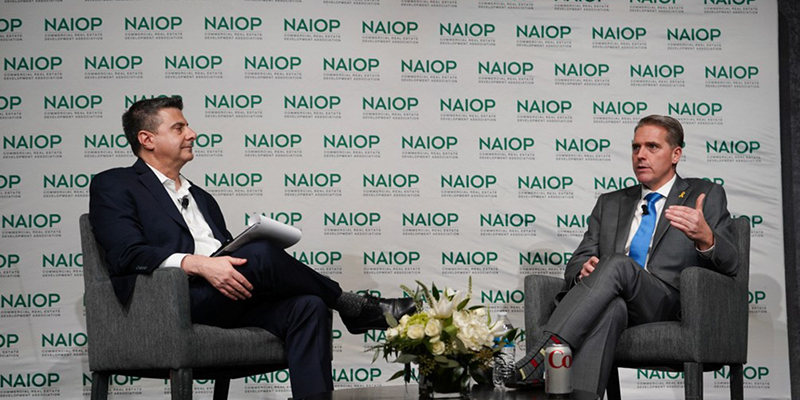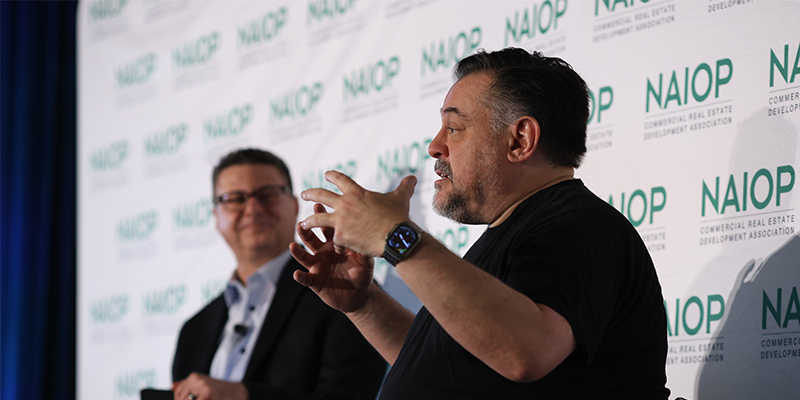By Marie Ruff
A new year always generates a flurry of activity on Capitol Hill, and a new presidential administration amplifies the flurry into a whirlwind of new policies, initiatives, personnel and more. During NAIOP’s Chapter Leadership and Legislative Retreat (CL&LR) earlier this month in Washington, D.C., members had the opportunity to hear from someone with extensive experience as both a presidential advisor and political analyst.
Keynote Scott Jennings, CNN contributor, conservative columnist and former advisor on four presidential campaigns, has decades of experience at the intersection of politics and the media. He began his career as a reporter and was recruited to work for then-Texas Governor George W. Bush’s 2000 presidential campaign efforts in Kentucky. Jennings became “a campaign hound,” he said, later directing operations for campaigns for Senator Mitch McConnell, George W. Bush’s presidential reelection campaign, and several others.
After starting his own public affairs firm, Jennings returned to the media with a regular newspaper column. CNN hired him in 2017 as an on-air contributor, and he has embraced his role as a conservative voice on a left-leaning news channel. At CL&LR, he spoke with NAIOP President and CEO Marc Selvitelli about a wide range of topics, including emerging political and policy trends in the new Trump administration.
The Era of Authentic New Media
Jennings is acutely aware of the reach of both traditional and new media – which can be complementary. For his regular appearances on a CNN show, “On any given night, we might have 400,000 or 500,000 watch the show live,” he said. “By the time I wake up the next day, millions of people have consumed it” in 60-second clips on X, Instagram, and other social media feeds. In the most recent presidential election, Jennings noted that then-candidate Donald Trump harnessed the power of unconventional approaches to campaign marketing to increase voter turnout among Trump-favorable groups.
“I think his election represented a massive rejection of the information distribution complex in this country,” Jennings said. “I mean, what did you hear the last two weeks of the election? ‘Oh, the Puerto Ricans are mad.’ ‘Trump’s going to lose Pennsylvania.’ ‘Oh, the polling has collapsed in Iowa.’ ‘[Presidential candidate Kamala] Harris is going to win Iowa.’”
“All the smart people were telling you all the things they wanted to hear, but they weren’t telling you the truth about what was actually happening in the electorate,” he said. “They were telling themselves stories.”
In politics, Jennings said, “You always want to fight the next battle, not the last one.” But in the 2024 presidential election, from his perspective, “Democrats were fighting the last battle, doing all the same old tactics.”
Meanwhile, Susie Wile and Chris LaCivita, senior advisors to Trump’s 2024 presidential campaign, decided, “We’re going to eschew the quantity game and we’re going to play the quality game,” Jennings said of the campaign’s “ground game” focus on low-propensity voters in swing states.
They calculated that those voters – people who rarely vote – and even no-propensity voters approved of Donald Trump more than any other voter cohort, and devoted efforts to increasing turnout among that group. This was a risky bet, Jennings noted, as this cohort was historically unlikely to vote but could also contribute substantially to the total number of votes.
“If you wondered why Donald Trump was hanging out at UFC fights on Saturday nights, this was why,” he said. “This was why they employed a strategy to reach people that most of the time, campaigns ignore.” And their bet paid off. Trump retained his core base of voters and expanded his coalition to chip away at groups that would traditionally have voted for Democrats.
“Trump changed the composition of the electorate,” Jennings said.
“There’s a rejection of people who seem to be telling you what you want to hear, not what they believe,” Jennings said. “This is part of the magic of Trump: He gives off the appearance of saying what he really believes in that moment. People didn’t feel that way about Harris. It’s called authenticity.”
Jennings noted that presidential candidate Kamala Harris’ appearance on the daytime talk show “The View” – what should have been a friendly interview – was a damaging turning point in her campaign. When co-host Sunny Hostin asked Harris whether she would have done anything differently from President Joe Biden over the past four years, Harris said she couldn’t identify anything. At a time when many Americans were looking for change on the economy and other issues, this response was widely perceived as a grave misstep.
Jennings called this response “the single biggest blunder in a political campaign in my lifetime.”
“And if any of you all are in the public relations business, let this be a lesson: Friendly interviews are the most dangerous,” Jennings said. “And that’s what happened to Harris.”
A Change Agent in Washington
The early weeks of the new Trump administration have been overwhelming for the traditional news media to cover on any given day, he said.
“Trump is a change agent, a disruptor,” Jennings said. And he’s doing what he believes he was elected to do: “smash Washington.”
“I think [the Trump administration has] largely executed on what the president can do unilaterally,” Jennings said. “Where the rubber hits the road will be when they try to cajole Congress into passing ‘one big, beautiful bill’ that encompasses everything [the president] wants to do from extending the tax cuts, energy changes, immigration, you name it.”
The odds of “one big, beautiful bill” passing the House (if not the Senate) are high, Jennings said. While Republicans hold a slim majority in the House, “Who wants to be the Republican that has to go home and say, ‘Oh yeah, I tanked Donald Trump’s entire campaign agenda – I did that.”
“So, I really do believe they will get something across the finish line…It’s likely to include an extension of the tax cuts, major immigration changes, major energy changes,” he said.
Power is a key consideration for commercial real estate and many other industries. Jennings said that “reducing energy costs is the fastest way for Trump to get some economic wins and reduce the costs of goods.”
While this is largely a very partisan time for politics, there’s at least one area where Jennings sees Democrats and Republicans currently united: beating China. From unraveling U.S. connections to TikTok to staying ahead on data center infrastructure and AI technology, both sides of the political aisle are motivated to be better than China.
“I actually have a lot of optimism about this, if only because most of the serious people in both parties recognize the threat that China faces to us economically, militarily and so on,” Jennings said. “It might be the most bipartisan thing in Washington being a China hawk right now.”








